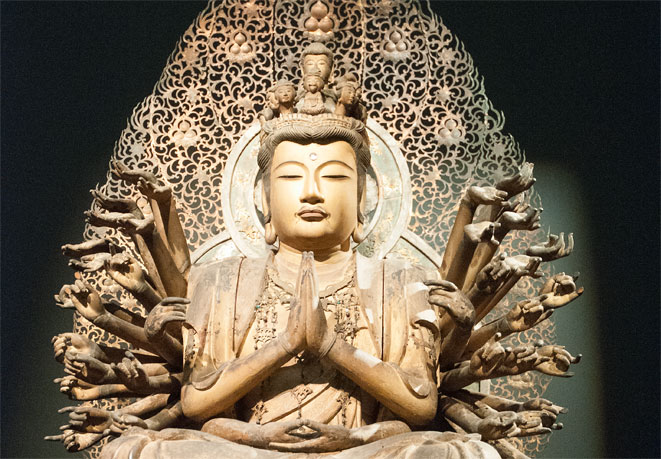A fascinating short interview with a Yale psychology professor who, based on compelling evidence, argues that feelings of "empathy" actually can be detrimental to doing good and making helpful decisions. He points, for example, at medical doctors who may find that overly sharing the pain of their patients can cause them to both lose objectivity in treatment and to burn out very quickly.
In the middle of the interview, he points to traditional Buddhist doctrines and studies on meditators that seem to point away from encouraging "empathy" (an inner sharing of the feeling of the person who is suffering) in favor of "compassion" (a willingness to help those in need, but with a heart that is rather more aloof and filled with equanimity).
From another intervview:
Please note that he is NOT advocating that people should be uncaring and unhelpful to others, but rather is only questioning the most effective emotions allowing one to do so.
I think there is something to this assertion. What do you think (especially those of you who are professional or active caretakers for people in need)?
Gassho, Jundo
SatToday
In the middle of the interview, he points to traditional Buddhist doctrines and studies on meditators that seem to point away from encouraging "empathy" (an inner sharing of the feeling of the person who is suffering) in favor of "compassion" (a willingness to help those in need, but with a heart that is rather more aloof and filled with equanimity).
From another intervview:
Summing up, compassionate helping is good for you and for others. But empathetic distress is destructive of the individual in the long run.
It might also be of little help to other people because experiencing others’ pain is exhausting and leads to burnout. This issue is explored in the Buddhist literature on morality. Consider the life of a bodhisattva, an enlightened person who vows not to pass into Nirvana, choosing instead to stay in the normal cycle of life and death to help the masses. How is a bodhisattva to live? In Consequences of Compassion (2009) Charles Goodman notes the distinction in Buddhists texts between “sentimental compassion,” which corresponds to empathy, and “great compassion,” which involves love for others without empathetic attachment or distress. Sentimental compassion is to be avoided, as it “exhausts the bodhisattva.” Goodman defends great compassion, which is more distanced and reserved and can be sustained indefinitely.
This distinction has some support in the collaborative work of Tania Singer, a psychologist and neuroscientist, and Matthieu Ricard, a Buddhist monk, meditation expert, and former scientist. In a series of studies using fMRI brain scanning, Ricard was asked to engage in various types of compassion meditation directed toward people who are suffering. To the surprise of the investigators, these meditative states did not activate parts of the brain that are normally activated by non-meditators when they think about others’ pain. Ricard described his meditative experience as “a warm positive state associated with a strong prosocial motivation.”
He was then asked to put himself in an empathetic state and was scanned while doing so. Now the appropriate circuits associated with empathetic distress were activated. “The empathic sharing,” Ricard said, “very quickly became intolerable to me and I felt emotionally exhausted, very similar to being burned out.”
One sees a similar contrast in ongoing experiments led by Singer and her colleagues in which people are either given empathy training, which focuses on the capacity to experience the suffering of others, or compassion training, in which subjects are trained to respond to suffering with feelings of warmth and care. According to Singer’s results, among test subjects who underwent empathy training, “negative affect was increased in response to both people in distress and even to people in everyday life situations. . . . these findings underline the belief that engaging in empathic resonance is a highly aversive experience and, as such, can be a risk factor for burnout.” Compassion training—which doesn’t involve empathetic arousal to the perceived distress of others—was more effective, leading to both increased positive emotions and increased altruism.
http://bostonreview.net/forum/paul-b...gainst-empathy
It might also be of little help to other people because experiencing others’ pain is exhausting and leads to burnout. This issue is explored in the Buddhist literature on morality. Consider the life of a bodhisattva, an enlightened person who vows not to pass into Nirvana, choosing instead to stay in the normal cycle of life and death to help the masses. How is a bodhisattva to live? In Consequences of Compassion (2009) Charles Goodman notes the distinction in Buddhists texts between “sentimental compassion,” which corresponds to empathy, and “great compassion,” which involves love for others without empathetic attachment or distress. Sentimental compassion is to be avoided, as it “exhausts the bodhisattva.” Goodman defends great compassion, which is more distanced and reserved and can be sustained indefinitely.
This distinction has some support in the collaborative work of Tania Singer, a psychologist and neuroscientist, and Matthieu Ricard, a Buddhist monk, meditation expert, and former scientist. In a series of studies using fMRI brain scanning, Ricard was asked to engage in various types of compassion meditation directed toward people who are suffering. To the surprise of the investigators, these meditative states did not activate parts of the brain that are normally activated by non-meditators when they think about others’ pain. Ricard described his meditative experience as “a warm positive state associated with a strong prosocial motivation.”
He was then asked to put himself in an empathetic state and was scanned while doing so. Now the appropriate circuits associated with empathetic distress were activated. “The empathic sharing,” Ricard said, “very quickly became intolerable to me and I felt emotionally exhausted, very similar to being burned out.”
One sees a similar contrast in ongoing experiments led by Singer and her colleagues in which people are either given empathy training, which focuses on the capacity to experience the suffering of others, or compassion training, in which subjects are trained to respond to suffering with feelings of warmth and care. According to Singer’s results, among test subjects who underwent empathy training, “negative affect was increased in response to both people in distress and even to people in everyday life situations. . . . these findings underline the belief that engaging in empathic resonance is a highly aversive experience and, as such, can be a risk factor for burnout.” Compassion training—which doesn’t involve empathetic arousal to the perceived distress of others—was more effective, leading to both increased positive emotions and increased altruism.
http://bostonreview.net/forum/paul-b...gainst-empathy
I think there is something to this assertion. What do you think (especially those of you who are professional or active caretakers for people in need)?
Gassho, Jundo
SatToday




Comment